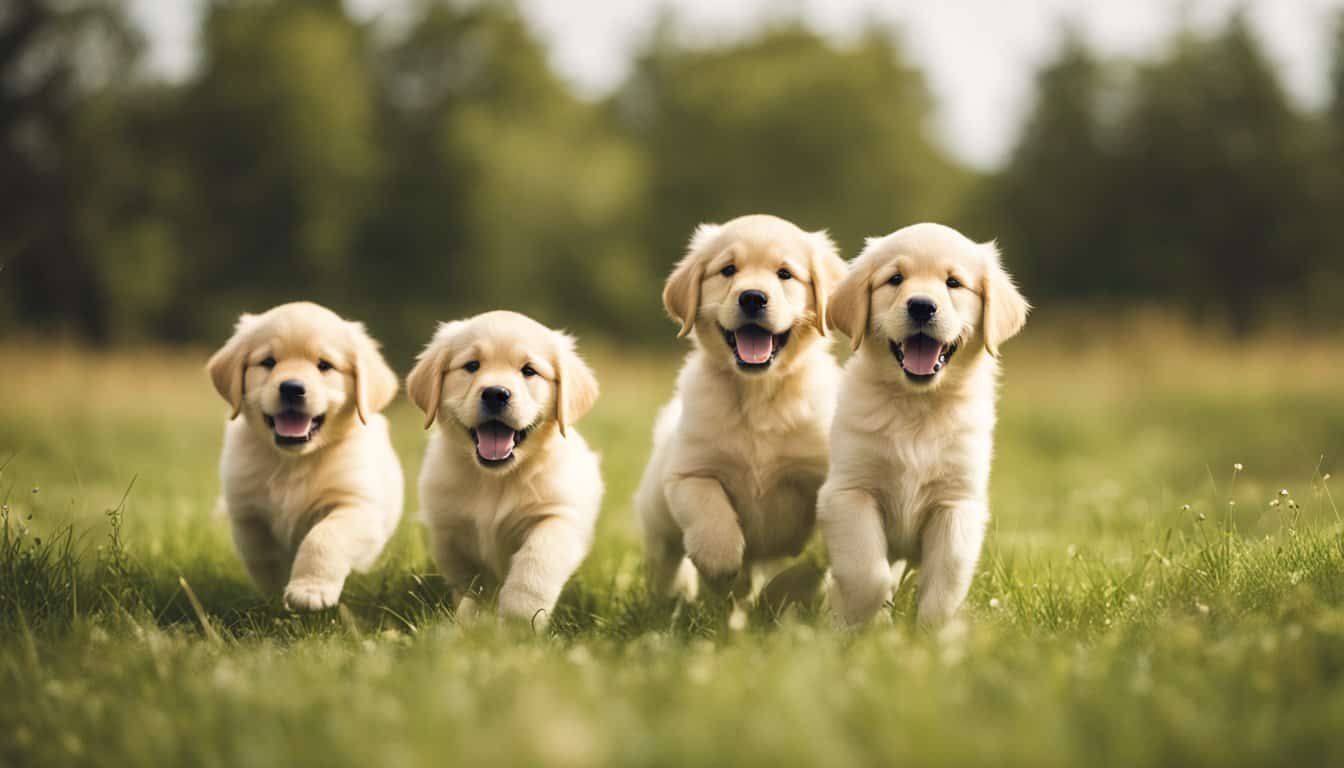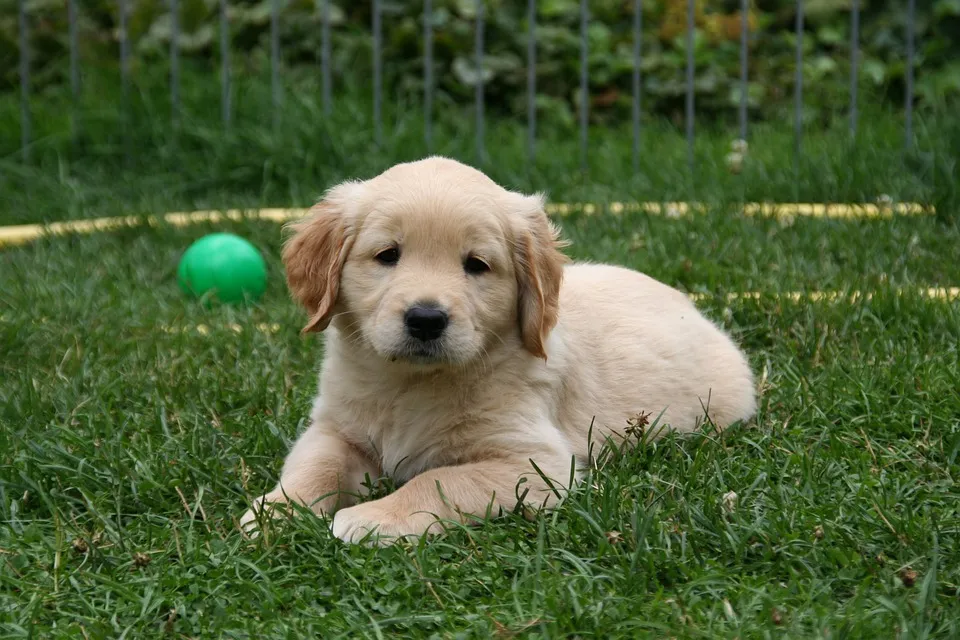Are you considering getting a golden retriever puppy? If so, you’re in for a treat! Golden retrievers are known for their friendly nature and loyalty. But have you ever wondered how fast these adorable puppies grow? In this article, we’ll explore the growth rate of golden retriever puppies, from birth to adulthood. Understanding their growth process can help you provide the best care and ensure a healthy development for your furry friend. So, let’s dive in and discover just how quickly these little bundles of joy grow!
From the moment you bring home a golden retriever puppy, you’ll notice that they grow at an astonishing rate. In fact, golden retriever puppies are considered one of the fastest-growing dog breeds. During their first year, they experience rapid growth and development. But just how fast do they grow? In this article, we’ll break down the growth milestones of golden retriever puppies, so you’ll know what to expect as your furry friend grows from a tiny ball of fluff to a full-grown adult. So, let’s explore the fascinating journey of a golden retriever’s growth!
Factors that Influence the Growth of Golden Retriever Puppies
As a dog lover and owner of a golden retriever and a Goldendoodle, you’re probably excited to watch your adorable puppy grow. Golden retriever puppies have a reputation for growing fast, but there are several factors that can influence their growth and development. Understanding these factors will help you provide the best care for your furry friend. Here are a few key factors to consider:
Genetics: Just like humans, genetics play a significant role in determining a golden retriever puppy’s growth rate. The genes inherited from their parents can determine their size and the rate at which they grow. If both parents are larger breeds, your puppy is more likely to be on the larger side as well.
Nutrition: A balanced and nutritious diet is crucial for optimal growth in puppies. Make sure you provide high-quality puppy food that meets their specific nutritional needs. Consult with your veterinarian to determine the appropriate portion sizes and feeding schedule for your growing golden retriever.
Exercise: Regular exercise is important for your golden retriever’s overall health and growth. Engage your puppy in age-appropriate activities to help develop their muscles and bones. However, be mindful not to overexert them, as their bones are still growing and too much exercise can lead to joint problems.
Health: Illnesses and health conditions can affect a puppy’s growth rate. Regular visits to the veterinarian for vaccinations and check-ups are essential to monitor your puppy’s health and address any concerns.
Gender: Gender can also influence growth in golden retriever puppies. Male puppies tend to be slightly larger and heavier than females, but the size difference is usually minimal.
Other factors: Other factors, such as the puppy’s environment, socialization, and overall well-being, can contribute to their growth and development.
By considering these factors, you can better understand the growth rate of your golden retriever puppy and ensure they receive the care and attention they need. Remember, every puppy is different, and growth rates can vary, so be patient and enjoy watching your furry friend grow into a happy and healthy adult.
The Average Growth Rate of Golden Retriever Puppies
As a dog lover and owner of a golden retriever and a Goldendoodle, you may be curious about how fast your furry friend will grow. Understanding the growth rate of golden retriever puppies can help you provide the best care and ensure they reach their full potential. So, let’s dive into the average growth rate of golden retriever puppies!
Birth to 8 Weeks
During the first 8 weeks of their lives, golden retriever puppies experience rapid growth. They double their birth weight within the first week and continue to gain weight consistently. By the end of this period, they are likely to weigh around 10-12 pounds.
8 Weeks to 4 Months
From 8 weeks to 4 months, golden retriever puppies continue to grow rapidly. They typically gain an average of 2-4 pounds per week. By 4 months of age, they might weigh anywhere between 25 and 45 pounds. It’s important to monitor their weight during this period to ensure they are growing at a healthy rate.
4 to 8 Months
Between 4 to 8 months, the growth rate of golden retriever puppies starts to slow down. They continue to gain weight, but at a slightly slower pace, usually around 1-2 pounds per week. By 8 months, they may weigh between 45 and 70 pounds. Remember, every dog is different, so these weight ranges are approximate.

« Unveiling the Mystery: The Astonishing Genetics of Golden Retriever Coat Colors Revealed
5 Secrets to Confirming Your Golden Retriever’s Pregnancy – Vet Consultation Holds the Key »
8 Months to 1 Year
From 8 months to a year, the growth rate of golden retriever puppies further slows down. They may gain around 1 pound per week or even less. By their first birthday, golden retrievers are generally close to their adult weight and size. Golden retrievers generally reach their full adult size between 12 and 18 months.
It’s important to note that these growth rates are averages and may vary based on genetics, nutrition, exercise, and other environmental factors. Regular veterinarian check-ups and a balanced diet are essential to ensure your golden retriever or Goldendoodle grows into a healthy and happy adult dog.
Physical Development Milestones in Golden Retriever Puppies
As a dog lover and owner of a golden retriever and a Goldendoodle, you are probably curious about how fast golden retriever puppies grow. Understanding the physical development milestones of your furry friend is important in providing the best care and ensuring their healthy growth. So, let’s dive into the key milestones of a golden retriever puppy’s physical development!
Birth to Two Weeks:
During this period, golden retriever puppies are completely dependent on their mother for nutrition and warmth. They will spend most of their time sleeping and barely opening their eyes. By the end of the second week, their weight starts to double from their birth weight.
Two to Four Weeks:
At around two weeks, golden retriever puppies will start to explore their surroundings and interact with their littermates. Their eyes and ears begin to open, allowing them to experience the world around them. During this time, they will also start wobbling on their tiny legs and developing their first set of baby teeth.
Four to Eight Weeks:
This is a crucial period for socialization. Golden retriever puppies will become more active, playful, and curious. Their coordination improves, and they will start teething more vigorously. It’s important to introduce them to various people, animals, and environments to ensure they develop into well-rounded adults.
Eight to Twelve Weeks:
Golden retriever puppies experience a growth spurt during this period. Their weight and height increase rapidly, and they become more energetic. It’s an ideal time to start basic training and establish routines. Ensure they have plenty of chew toys to alleviate teething discomfort and provide mental stimulation.
Three to Six Months:
At this stage, golden retriever puppies are approaching adolescence. They may experience a growth plate closure, so it’s essential to monitor their weight and adjust their diet accordingly. Continue their training and socialization, as it helps shape their behavior as adult dogs.
Six Months to One Year:
Golden retriever puppies are starting to resemble adult dogs, but they still have some growing to do. Their adult coat starts to come in, and their energy levels stabilize. Be mindful of their exercise routine to prevent overexertion during this period of bone and joint development.
Remember, every golden retriever puppy is unique, and their growth rate may vary based on genetics, nutrition, exercise, and other factors. Regular visits to the veterinarian and a balanced diet are

Nutritional Needs for Proper Growth in Golden Retriever Puppies
As a dog lover and owner of a golden retriever and a Goldendoodle, I understand the importance of providing the best care for your furry friends. One crucial aspect of their care is ensuring they receive the proper nutrition for healthy growth. Golden retriever puppies, in particular, have a fast growth rate during their first year, so it’s essential to meet their specific nutritional needs to support this rapid development.
Here are a few key points to consider when it comes to the nutritional needs of your golden retriever puppies:
1. High-Quality Puppy Food: Choosing a high-quality, commercially available puppy food formulated specifically for large breed puppies is vital. These foods are often designed to provide the right balance of nutrients, such as protein, fat, vitamins, and minerals, to support their growth.
2. Balanced Diet: It’s crucial to provide a well-balanced diet that includes all the essential nutrients your golden retriever puppy needs. This includes a mix of protein, fats, carbohydrates, vitamins, and minerals. Consult with your veterinarian to determine the appropriate amounts and ratios for your puppy’s specific needs.
3. Controlled Feeding: While it’s tempting to give your adorable golden retriever puppy unlimited access to food, it’s important to control their portions and establish a feeding schedule. Overfeeding can lead to excessive weight gain, which can put strain on their developing joints and lead to potential health issues.

4. Avoid Rapid Growth: While you want your golden retriever puppy to grow healthy and strong, it’s crucial to avoid rapid growth, as it can contribute to skeletal problems. Puppies should gain weight steadily, at a rate of 1-2 pounds per week, which will ensure proper development without putting unnecessary stress on their bones and joints.
5. Regular Vet Check-ups: Regular visits to the veterinarian are essential to monitor your puppy’s growth and ensure they are on the right track. Your vet can also provide guidance on their nutritional needs based on their specific growth rate and overall health.
Remember, every golden retriever puppy is unique, and their growth rate may vary. By providing a nutritious and balanced diet, monitoring their growth, and involving your veterinarian, you can help support their healthy development and set them up for a happy, active life as they grow into adulthood.
Exercise and Behavior Training for Healthy Growth in Golden Retriever Puppies
As a dog lover and owner of both a golden retriever and a Goldendoodle, I understand the importance of exercise and behavior training in ensuring the healthy growth and development of your furry friend. With my experience working at animal shelters and veterinary offices, I’ve learned a thing or two about keeping your golden retriever puppy happy and active. So, let’s dive into the world of exercise and behavior training!
Exercise: Golden retriever puppies are known for their boundless energy and love for physical activity. Regular exercise is crucial for their physical and mental well-being. Aim for at least 30 to 60 minutes of exercise per day, consisting of walks, playtime, and engaging activities. This will help them burn off excess energy and prevent behavior issues that may arise from boredom.

Behavior Training: Proper behavior training lays the foundation for a well-behaved golden retriever puppy. Start early and be consistent with your training sessions. Use positive reinforcement techniques, such as treats and verbal praise, to reward good behavior. Focus on essential commands like sit, stay, come, and leash training. This will not only make your puppy more obedient but also strengthen the bond between you and your furry companion.
Socialization: Socializing your golden retriever puppy is crucial to their overall development. Expose them to various environments, people, and other animals from a young age. Arrange playdates with other friendly dogs and introduce them to different sounds, sights, and experiences. This will help them become well-adjusted and confident adult dogs.
Mental Stimulation: In addition to physical exercise, provide mental stimulation to keep your golden retriever puppy’s mind sharp. Puzzle toys, treat-dispensing toys, and interactive games are great options to challenge their problem-solving skills. Engage in training sessions that incorporate mental exercises, such as teaching new tricks or obedience commands. Mental stimulation will prevent boredom and help curb destructive behavior.
Remember that every golden retriever puppy is unique, so adapt the exercise and behavior training routine to suit their individual needs. Regular consistency and positive reinforcement are the keys to success. With proper exercise and behavior training, you can ensure a healthy, happy, and well-rounded golden retriever or Goldendoodle that will bring joy to your life for years to come.
Continues…

Conclusion
To ensure the healthy growth of your golden retriever puppies, it is essential to meet their specific nutritional needs. This includes providing them with a high-quality puppy food designed for large breed puppies, maintaining a balanced diet, controlling their portions, and scheduling regular vet check-ups. Exercise and behavior training are also crucial for their development. Aim for at least 30 to 60 minutes of daily exercise, engage in behavior training using positive reinforcement techniques, socialize them from a young age, and provide mental stimulation to keep their minds sharp. By following these guidelines, you can support the healthy development of your golden retriever puppies and set them up for a happy, active life. Remember, their first year is a critical time for growth, so it’s important to give them the proper care and attention they need.









